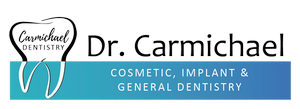Dental implants at Dr. Carmicheal’s dental office
Dental implants are an amazing solution for replacing one or more missing teeth that are broken and failing or to stabilize a denture for comfort and effective chewing and smiling. Finally we have a predictable way to replace a tooth that can last forever and won’t decay ever again. When the correct conditions are present and the correct technique is followed by a good clinician, a dental implant will be fully successful over 98% of the time. Implants can be life changing in giving a smile back to someone who has lost hope, chewing ability to someone who never thought they’d eat certain foods again, and confidence in talking and living life to the fullest knowing their teeth are beautiful and healthy.
Let’s Talk About Your Teeth
Have you lost one or more teeth? It happens.
Let’s get you back to a healthy place! Call us at (858) 484-2560.
We can bring you in for a helpful conversation about your dental health and treatment options.
In the long run you’ll save time worrying and be that much closer to good health and peace of mind.
Frequently Asked Questions
A: Dental implants are the only tooth replacement option to replace both the tooth root and the tooth crown. Unlike removable dentures or dental crowns and bridges, dental implants will not shift or slip in place and require no changes to be made in a regular healthy dental hygiene routine. Naturally strong and resistant to cavities, dental implants are a highly desirable form of tooth replacement for patients of various dental needs and backgrounds.
A: Dental implant surgery is a common option for replacing missing teeth. Unlike removable dentures that rest on the gum line, dental implants are a long-term permanent treatment that is surgically implanted into the jaw bone. They look and function like real teeth. If one or more of the following circumstances apply to you, dental implants may be ideal if:
- You are missing 1 or more teeth
- You are sick and tired of having broken, hurting, and decayed teeth.
- You have ample amounts of bone to secure the implant
- Your gums and tissues are Healthy
- You are unwilling or unable to wear dentures
- Your Jawbone has reached full growth
A: A dental implant is a 1- tooth solution to a 1- tooth problem. As opposed to a denture or dental bridge which has to use the teeth next to the bad one to hold on to. This means many good healthy teeth have to be cut on to fix and replace 1 bad tooth.
Most patients find dental implants will improve appearance, improve speech, improve comfort, and easier eating. Remember, dental implants do not affect working teeth, and can also improve your overall oral health. Plus, it’s easier to brush between individual implanted teeth. With good care, dental implants can last a lifetime.
A: No need to Fear a dental implant procedure. We start with coming up with a custom plan to give you the exact implant to fit your needs. Sedation can be used to sleep through procedure as well. We get the area numb, and then use a succession of drills to create a spot for the implant to rest and replace your tooth root. We then let the area heal for several months to all your body to grow onto the implant surface and become one. After healing has taken place then we can build your new tooth or teeth onto the implant to look and feel like a tooth was never missing.
Most dental implants are made with biocompatible Titanium. The process of your bone healing around the implant is called Osseointegration. This means that your body actually likes the material and grows onto it and makes it a part of you. There are different types of dental implants available and the exact surgery will depend on the type of implant that is chosen and jaw condition.
A: Dental implant surgery is performed in phases, with the entire process lasting anywhere from three to nine months, including time off for healing and the growth of new one around the implant.
Phase One: placement of the dental implant into the jawbone, followed by a few month’s rest.
Phase Two: placement of the abutment and the new beautiful tooth, followed by a healing period.
Note: Some individuals will require a bone graft surgery prior to having dental implant surgery. This is common in individuals who have a jawbone that is too soft or is not thick enough to sustain the implant. This will be determined at your consultation visit.
A: Very! Unlike traditional dentures and bridgework, dental implants do not cause any damage to the bone. All of the material used for dental implants is safe and does not cause decay. When done with the correct technique and only the best materials are used, you have a very high success rate.
Those with high blood pressure, diabetes or other medical conditions should check with their health care provider before having dental implant surgery. Most individuals with these conditions will receive approval for the surgery, as long as certain precautions are met.
A: Very! Unlike traditional dentures and bridgework, dental implants do not cause any damage to the bone. All of the material used for dental implants is safe and does not cause decay. When done with the correct technique and only the best materials are used, you have a very high success rate.
Those with high blood pressure, diabetes or other medical conditions should check with their health care provider before having dental implant surgery. Most individuals with these conditions will receive approval for the surgery, as long as certain precautions are met.
A: There are health risks associated with any type of surgery. Dr. Carmichael takes great care in making the procedure very safe and successful. With dental implant surgery complications are rare and when they do occur they are generally mild, requiring minimal treatment. Possible health risks associated with dental implant surgery include:
- Infection occurring at the implant site
- Damage to surrounding teeth or blood vessels
- Nerve damage
- Pain
- Numbness
- Tingling
- Sinus problems
A: Dental implant surgery is 98% successful. However in rare cases, if the bone does not fuse to the implant, it will have to be removed and the procedure can be repeated. Maintaining good oral hygiene after dental implant surgery can reduce the risk of complications and problems











